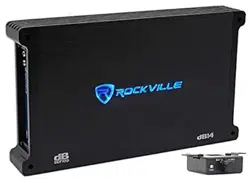Loading ...
Loading ...
Loading ...

22
PROBLEM
Amp keeps blowing fuses
Amp gets very hot
Distribution Block Amp Fuse (if applicable) - If both sides of the main fuse have power, and one side of the
distribution block has power, but the other side of that fuse is dead, then you’re either dealing with a shorted
power wire or an internal amplier fault. There are a few ways to determine which one is the culprit, depend-
ing on how your amp is installed and where the wires are routed.
1. Check if you can see power wire that connects the distribution block to your amp. In an ideal situation,
you’ll be able to see the entire length of the wire. If that isn’t possible, then the next best thing is to just dis-
connect the power wire from your amp, make sure that the loose end isn’t in contact with ground, and check
whether the fuse still blows. If it does, then the problem is in the power wire, and replacing it will almost
certainly x your problem. Of course, you’ll have to take care when routing the new wire so that it doesn’t
end up shorting out as well. If the fuse doesn’t blow with the power wire disconnected from your amp, then
you have an internal amplier problem.
Internal Amplifier Fuse (if applicable) - If the fuse blows when the amp is turned up, then you likely have
subwoofers that are either incompatible or that are wired at too low of an impedance. Rewire to achieve
proper impedance, or replace the subwoofers with compatible ones. Check and make sure the power and
ground wires did not get crossed. Also, check and make sure your speaker wires are not crossed.
1. The main reason amps overheat is if the impedance they are running at is very low, or if the subwoofer
requires more power than the amp can give it. Also if the wiring cannot give the proper current fast enough,
it can cause the amp to get hot as well. Make sure the amp is running at the proper impedance, or use
subwoofers that are compatible with the amp. Make sure the wiring is correct and you are using the proper
wires for your system.
2. A poor ground cable connection can cause your amp to get very hot. Check your ground connection and
make sure that the cable is securely tightened.
3. Check the location where your amp is mounted. Make sure it is in a spot where it will receive proper ven-
tilation.
CAUSE/SOLUTION
Loading ...
Loading ...
